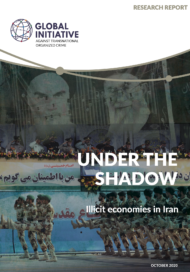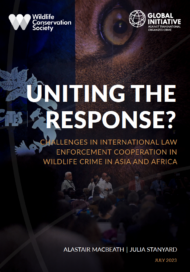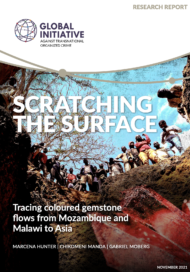Posted on 20 May 2020
In Pakistan, the COVID-19 pandemic has compounded critical economic challenges, as well as issues related to governance and internal security. The outbreak has also brought about a series of changes related to organized crime and non-state actors, and there is a need for greater vigilance in monitoring these trends.
Since April, the National Initiative Against Organized Crime (NIOC) Pakistan, one of the organizations supported by the Global Initiative Resilience Fund, the organization has been tracking organized-crime issues in that country in a weekly review titled ‘CoronaCrimeWatch Pakistan’. The brief helps to inform institutional and community responses, and is compiled from open-source reports, as well as contributions from various NIOC experts.
This blog highlights some of the emerging trends that NIOC is seeing in Pakistan’s illicit economy as a result of COVID-19.
The first relates to drug trafficking. In April, the Anti-Narcotics Force (ANF) and the Pakistan navy confiscated significant amounts of heroin, opium, hashish, crystal meth and – in one case – a quantity of morphine.
Some of the largest seizures include 100 kilograms of meth, confiscated in the Makran coastal region; over a tonne of heroin, dumped in a forest in Balochistan; and over a tonne of morphine – also in Balochistan.
These large drug busts, along with many smaller confiscations and arrests in other parts of the country, point to an increased supply of narcotics in Pakistan. This could be the result of efforts to meet heightened demand during the pandemic or opportunism on the part of drug producers and traffickers. These groups may be looking to exploit decreased law-enforcement capacity for drug control, as attention is diverted towards containing COVID-19.
In addition to these drug busts, the ANF, Frontier Corps and Pakistan customs authority have also discovered and confiscated large amounts of narcotics that were intended to be smuggled into foreign countries. Some of the largest seizures involved 314 kilograms of meth and 2.4 tonnes of hashish seized from two fishing boats; 700 kilograms of heroin and 80 kilograms of opium, found in a Belgium-bound container in Qasim; 8 tonnes of hashish and 120 kilograms of crystal meth heading from Balochistan to Iran.
Due to the immense pressure on Pakistan’s economy as a result of the pandemic, the Financial Action Task Force (FATF) has provided a three-month extension for Pakistan to submit its compliance report. The new deadline, now September this year, is intended to allow the government more time to focus on the country’s economy and take concrete initiatives against money laundering and terrorist financing.
It appears that Pakistan has seized this opportunity, and is making efforts to speed up the process of meeting FATF requirements. After a temporary COVID-19-related closure, the interior ministry has initiated one of the FATF priorities, namely to establish a database to curb money laundering and terror financing. Two new anti-terrorism courts were opened in April, doubling the number since the first two were opened in December 2019. These courts are intended to dedicate judicial capacity for dealing with terror-financing-related trials.
In the meantime, however, a tax-amnesty scheme that allows people to invest black money into the construction sector has been announced by Prime Minister Imran Khan. Economists fear that this may cause issues with the FATF, which has already warned that criminals could take advantage of the pandemic to carry out financial fraud and exploitation scams.
Additionally, a significant number of names were removed from Pakistan’s national counter-terrorism authority’s watch list. The list was originally intended to help financial institutions avoid doing business with suspected terrorists. It had been updated because it had become ‘bloated with multiple inaccuracies’, according to a Pakistani official from the interior ministry. Combined, these developments may lead to future challenges from the FATF.
COVID-19 has also led to an increase in online traffic, which has, in turn, heightened the expected threat of cybercrime – including new web-based exploitation methods, fundraising for fake charities and various medical scams. In response, the country’s Federal Investigative Agency (FIA) and financial institutions launched a social-media awareness campaign, while the Pakistan Telecommunication Authority (PTA) has advised against the use of public Wi-Fi networks.
In April, an alarming data breach of 115 million mobile users was discovered. In response, Senator Rehman Malik directed the FIA and PTA to investigate and report on the darknet sales of the data.
There has also been a rise in complaints from parents about the targeting of children for personal details, photographs and banking information. This led the Cyber-Crime Wing (CCW) of the FIA to issue additional warnings, advising that internet access be more carefully controlled.
Six gangs of Nigerian men were recently busted for scamming Pakistani citizens, particularly targeting rural residents. The scammers used a variety of social networks, including Facebook, LinkedIn, YouTube and Tinder, to target citizens, promising millions of dollars in return. Twenty were arrested.
Despite a 40% increase in internet use since the COVID-19 outbreak and the heightened cybercrime risk, the FIA claimed that cybercrime has, in fact, decreased. In a statement, the CCW said this was a result of the ‘effective measures’ adopted by the agency. However, many business owners have contested this claim, saying that lowered cybercrime rates are due to their own anti-fraud strategies – such as using separate bank accounts.
The implications of the COVID-19 pandemic still have to unfold fully, but it is clear that it has already presented many new challenges for Pakistan. The apparent increase in drug trafficking and other threats is undermining the state’s ability to focus efforts on citizens’ health and safety while simultaneously trying to stabilize Pakistan’s economy.
Despite positive results indicated by drug confiscations and a claimed decrease in cybercrime, a cautious approach must be taken to minimize the exploitation of these difficult times by criminals. The FATF deadline extension has relieved some pressure, but recent steps made by the government are a red flag, and they need continued monitoring.
Cover: European Union, 2020 (photographer: Mallika Panorat 12 March 2020)



